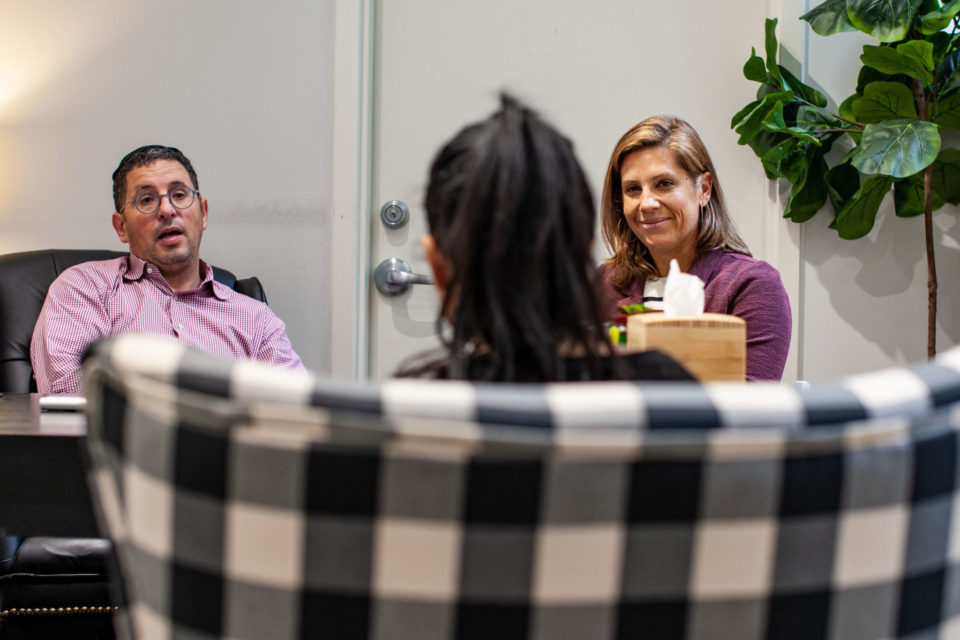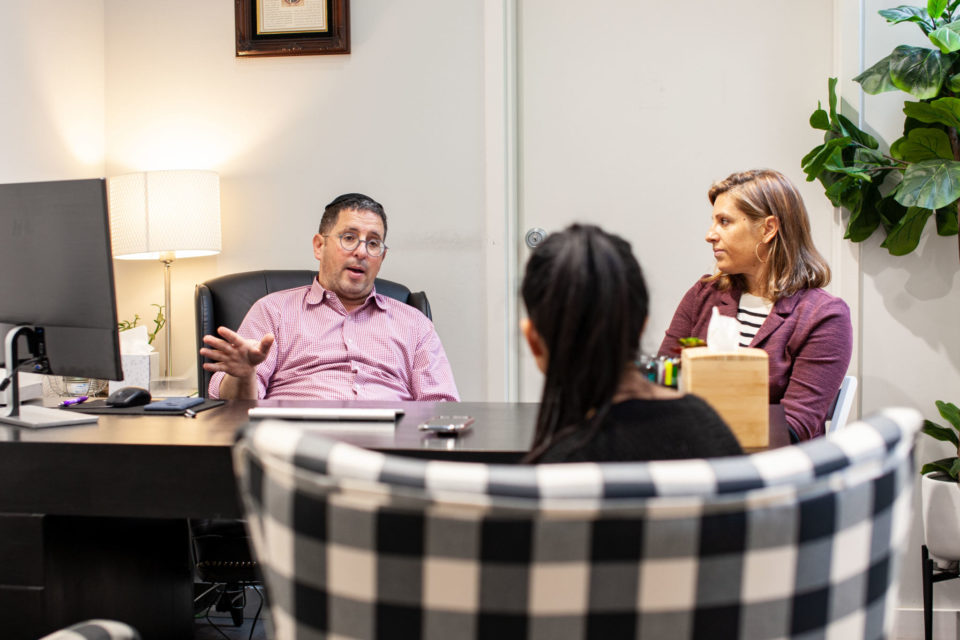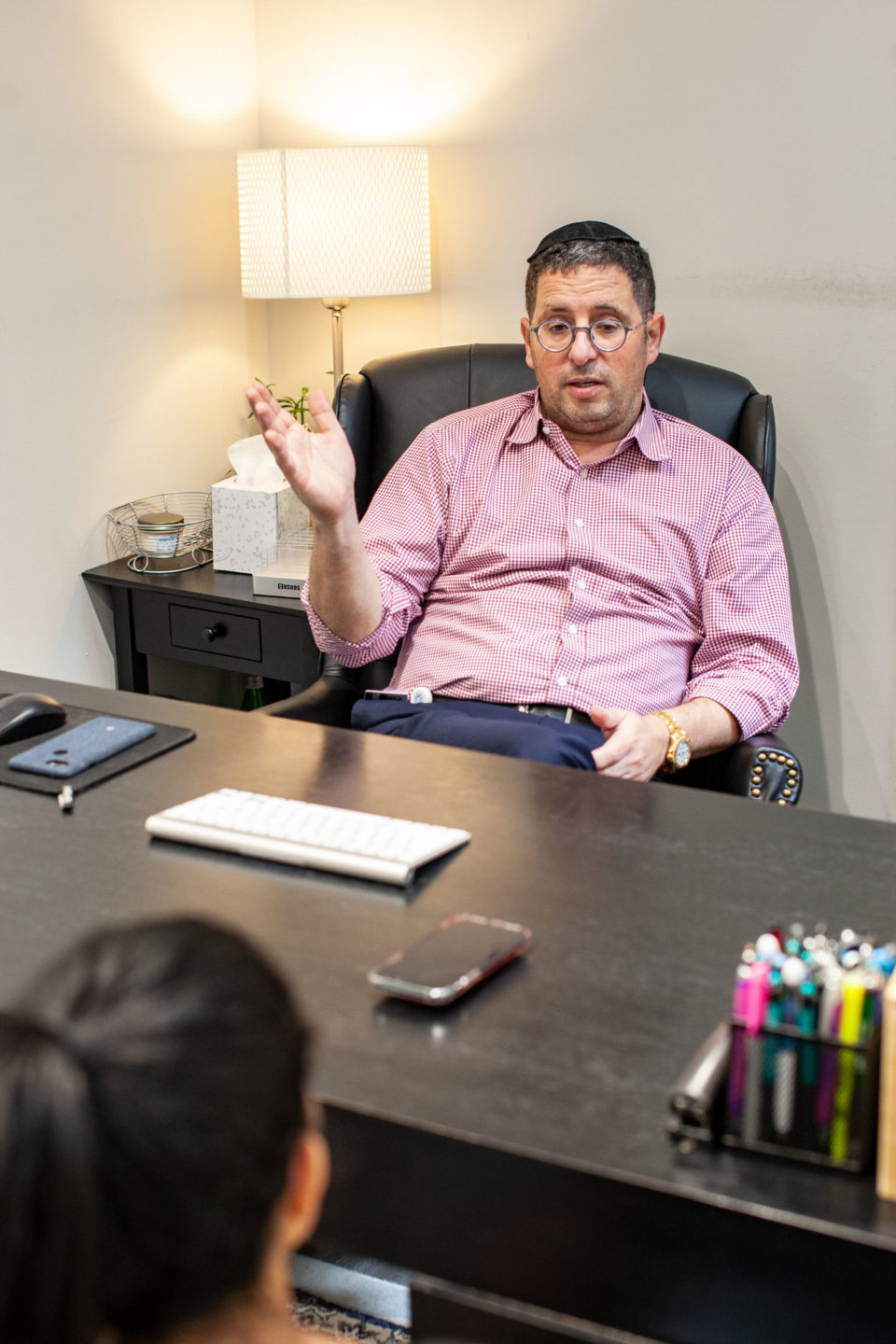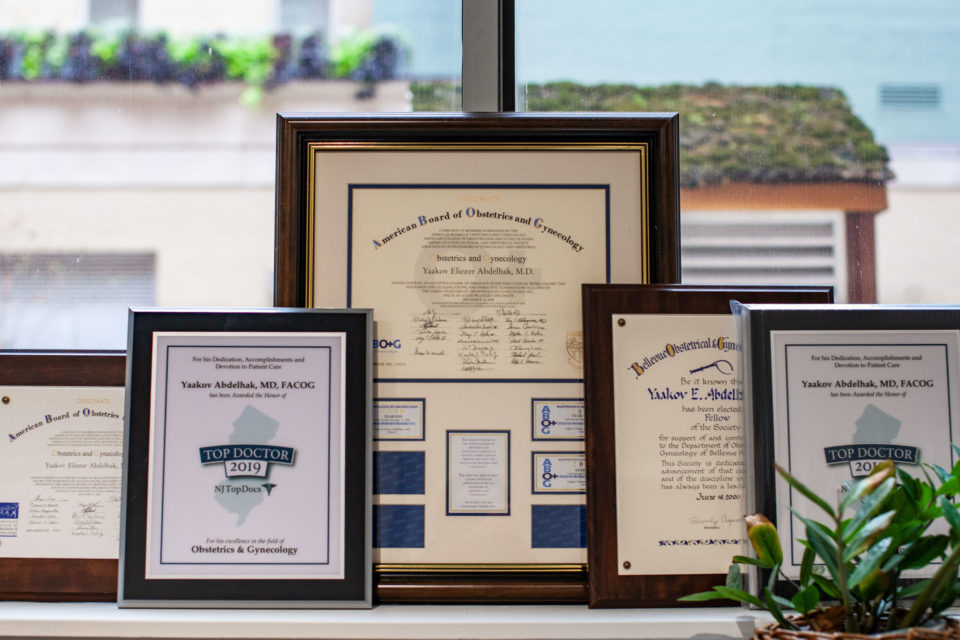When I got pregnant with Mia over 7 years ago, I was living in Jersey City. At the time, I couldn’t find a good local OB/GYN that specializes in obstetrics. I had to schlep all the way to the Upper East Side to see a doctor there. I loved her very much, she was great, but it would’ve been nice to have someone I could trust locally.
Pregnancy is a monumental occasion in a woman’s life. So much happens to your body and it’s different for every woman. Even if you do a lot of research and read all the books, you might encounter things you’re not aware of. It’s good to have someone you could trust to help you through the process. Your OB/GYN is essentially your birth coach and it’s important that you choose someone you trust and are comfortable with. Integrative Obstetrics & Maternal Resources opened their doors in Jersey City a few years ago, but they have locations in Hackensack and Howell. They specialize in pregnancy, while other OB/GYN offices focus on women’s health, which I love.
Doctor Yaakov is a pioneer and he delivers 8 to 10 babies per week. He’s encountered every scenario a woman giving birth could encounter. Most importantly, and this is important for everyone to know, is that they have the lowest C-section rate in the Hudson County area. Now why is that important? Unfortunately, when a woman has complications, some doctors will be quick to decide to give her a C-section as opposed to figuring out a better solution (of course, depending on the complications). At Integrative Obstetrics & Maternal Resources, they put the mother first.
Check out this full length video interview, as well as the full transcript below.
What are your names?
Yaakov
: I’m Yaakov Abdelhak, the physician who started the practice – Integrative Obstetrics & Maternal Resources. We also have Kristin Mallon, the midwife who has been with me for 8 years.
Kristin: I’m a Certified Nurse Midwife.

What is a midwife?
Kristin: It’s just a different type of training. We focus mainly on pregnancy whereas physicians learn gynecology (GYN), GYN surgery, and oncology. We focus mainly on childbirth and pregnancy.
How long have you guys been in this Jersey City location?
Kristin: We came to Hoboken in 2016 and moved to Jersey City about 2 years ago.
How many locations do you have?
Yaakov: The practice now has 3 locations. The main one, the initial one, is in Hackensack near Hackensack Medical Center, which is our main base of operations for delivery. We have this Jersey City location and then we have our location in Howell, which is exit 98 on the Garden State Parkway.
You specialize in pregnancy. Why did you decide to focus just on pregnancy?
Yaakov: I did my residency in obstetrics (OB) and gynecology. I always knew I’d be an obstetrician working in the hospital can be depressing and OB is a very uplifting field. I finished my residency in OB/GYN and did a fellowship in maternal fetal medicine, which is high risk obstetrics. I also knew I wouldn’t be a consultant, it’d be A to Z. From conception to delivery.
Kristin: A lot of high risk doctors are perinatologists. Dr. Abdelhak went to medical school, did his residency, and did a fellowship. So he’s not just an OB/GYN, he’s also a perinatologist. Most perinatologists – or maternal fetal medicine specialists (MFMs) – only consult and see patients in an office for highest risk cases. Dr. Abdelhak sees them in the office, the highest risk cases, the complicated cases, and does deliveries – low risk deliveries and high risk complicated deliveries.
Amazing. I mean, it’s an amazing job. All these beautiful miracles.
Yaakov: You experience the parents’ joy and excitement every time.
How does it feel?
Yaakov: I happen to be very empathetic, so I do feel the excitement and joy. It’s a nice way to spend your day, shepherding a woman through a high risk pregnancy and delivering a baby, especially if there were obstacles along the way. Moms holding a healthy baby is very satisfying.
How many babies a week do you deliver?
Yaakov: In the practice, we deliver somewhere between 8 and 10 a week.
8 to 10 a week? That’s incredible!
Yaakov:
Yeah, we have four practitioners here.

That’s amazing. Any birth story that stands out?
Kristin: They’re all very unique. I always say, a birth is like a painting. You couldn’t say one is the same as the other.
Yaakov: I had a patient who had very complicated early deliveries and was told by several physicians that she shouldn’t have any more children. She had never had a natural pregnancy, but she got pregnant naturally and it was a miracle. She was freaked out because she wasn’t supposed to be pregnant. I was the fifth MFM she saw and I told her I thought she’d carry far with a healthy baby. She was told by several others to terminate. She took my advice and went ahead with the pregnancy. I explained to her my thinking and why I thought she’d be okay, and she was okay. There were some bumps along the road and she ended up with a very dramatic delivery. She previously had 3 sons – twins plus a third son – that were all born at 26-27 weeks. Her last child was the first and only girl, and she carried until 38 weeks. That daughter’s middle name is named after me. I think it’s really cool.
You saved her, in a way.
Yaakov: I once had a patient with twins who had a cervical incompetence, meaning the cervix was not strong and pops open kind of silently. By the time we found out the cervix was open, there were arms and legs coming through. We drained fluid from her belly, put her in a kind of upside down position, and gingerly put a stitch around her cervix. I was sweating so much, I was soaked. It’s like trying to walk across a frozen pond when you know the ice is thin. Any step can be the one to end everything. The bag was right there and could easily have ruptured, and that would have been the end of the pregnancy. Miraculously, we closed her cervix and she carried for another 3 and a half months. She had beautiful twin girls. Every Purim, she brings both daughters to come visit me.
It kind of puts every job in perspective. Most people are stressed out about their jobs, but when you’re facing moments like that…
Yaakov: It’s really nice when you feel like you’ve made a big difference in someone’s life.
Can we talk about statistics of birth rates, natural vs C-section? I’m sure people don’t know about it, or don’t know that it’s healthier to have a natural birth.
Yaakov: The whole philosophy in the office is built around why there’s a C-section epidemic and what we can do about it. Two reasons there’s a C-section epidemic:
They’re too easy. They’re easy for physicians, they’re easy for patients. When you do a C-section, it takes 45 minutes to deliver a baby. When you do it naturally, it can take all day. There’ll be a bias regardless of how ethical a physician is, they’ll learn towards C-sections because it’s safer, easier time-wise, less work, and you can schedule it.
Another problem is that babies are just too big. Go back 100, 200 years and the average baby was probably 5-6 pounds. There weren’t 9 pound babies because at that size, mothers likely didn’t make it through delivery. What’s happened over generations is that we’ve all gotten healthier. Women are taller, healthier, they can handle more. Babies have evolved faster than our mothers. Babies are bigger now than they’ve ever been, so big that they don’t fit. That’s also partially due to many of us living sedentary lifestyles. If somebody has a job these days, she sits at a desk and types rather than being out in the fields to milk cows. It’s different lifestyles with less exercise and a lot more food, more processed foods. It’s all sugar. We’re having bigger babies and they don’t always fit. Do not trust nature to allow you to have a normal delivery. You’ll end up with a 9 pound baby, overdue, that doesn’t come out. Watch the size of the baby and be mindful of how you eat. If the baby is getting too big specifically for that mother, let’s get that baby out in a window that’s going to work.
Why is a natural childbirth healthier in the long run?
Yaakov: Anything natural is generally the way you should go. People like doing things as they were meant to happen. For some women, a C-section is a blessing because without it, they wouldn’t have a healthy child or wouldn’t have survived the pregnancy. C-sections are a wonderful thing in the right context. Short of needing a C-section, it’s actually nicer to have a natural delivery because you feel good afterwards and get to enjoy your child and aren’t recovering from a C-section. I tell patients often, having a C-section is like going on a really expensive vacation and putting it on your credit card. You’ll have a nice time, but the bill’s coming afterward and that bill is hard to deal with when you have a newborn.
When I was pregnant, I did so much research because I wanted to deliver naturally. I didn’t want a C-section, I wanted to breastfeed and I heard that a C-section does affect breastfeeding. When I was reading the statistics of all the hospitals in the area and how high the stats for C-sections were, and all these crazy stories of doctors being selfish about it, it scared me. It’s important for women to research and learn about what their bodies are going through. It’s kind of a traumatic experience. No one talks about the process and how intense it is.
Yaakov: Of course, there are medical complications that are much more common. The risk of hemorrhaging is higher with a C-section, as well as having an infection. The most important factor is that it compromises your uterus. If a woman has a C-section and then has another baby, they now have a previous scar and it’s a higher risk for complications like placenta abnormally attaching or not holding up through the pregnancy. With the population of women who want to have several children, avoiding a C-section is very important.
Kristin
: You brought up a good point – you were scared, didn’t know where to go, and had to do a lot of research. You want to feel like you trust your provider and that person has your back and your best interests at heart. If they do say you need a C-section, you trust that it’s in your best interests and necessary. We have cesareans but don’t want to do unnecessary C-sections.
What if the baby is breech?
Yaakov: Part of the practice is avoiding C-sections. First time delivery is most likely the time you find out that it’s a tight fit. We’ve had patients who’ve had C-sections and want to go back to normal delivery. Some days, we have patients that are breech, and we specialize in either turning a baby or delivering breech. We do at least one or two breech deliveries a month. Last night, we had a set of twins, normal delivery. I’ve delivered three sets of triplets, normal delivery. We do try to think outside the box and try to offer alternatives that are hard to find elsewhere.

For the future dads, what advice would you give them if they’re supporting their partner that’s going through a pregnancy?
Yaakov: The best thing a partner can do is get educated. Most of the issues coming up during pregnancy are related to anxiety or stress, which is related to not having knowledge. Any person who educates themselves can be a wonderful resource for their partners. They can say, “I read about that, I don’t think it’s a big deal” or “Maybe we should call the doctor.” That’s participating in the pregnancy, and it’s hard for men to participate in pregnancies. We’ve evolved – now we don’t pace the hallways with cigars anymore. Now they’re in the delivery room, holding their wives’ hands. If somebody wants to understand what their wife is going through, which is hard, getting educated and understanding what a pregnancy entails is really important.
Is there anything else you want people to know?
Yaakov: At the start of my practice, it was a very small boutique practice. Very limited population. Word of mouth spread and I didn’t get advertisements initially. It grew, then I opened my second location. When Kristin joined me, we opened the Jersey City office and felt it was a need out here. We have offices in Central, Eastern, and Northern New Jersey. We’d like for general populations to know there’s another alternative to somebody who just happens to be geographically really close. If you want to make a little bit of trip to come see us, you’ll be very happy you did. We aim for practically a 100% satisfaction rate.

And it’s a cozy, beautiful office. That’s what I love. It’s very inviting.
Yaakov: Everybody who works here is happy to be involved. We’re all on a mission to give really good health care. When patients walk into our office, they’re greeted by smiles and not a bunch of signs. We run the office on time as much as we can. We do pretty well, and patients look forward to their visits.
Are there a lot of babies coming through Jersey City?
Kristin: Yeah, it’s booming here!
Yaakov: The average patient is in their mid-30s with their first baby, which is different than most of America.
Kristin: The average age in America is 27, I think, to have your first baby. The average age in a major metropolitan area like DC, LA, New York is 32. I think Jersey City is higher, I agree.
Yaakov: The nice thing about Jersey City is that it’s a true melting pot. Looking at couples, I’m surprised when they have lineage to the same part of the world because you have everything here.
Awesome, anything else you want to cover?
Kristin: We do lots of different types of deliveries that you wouldn’t find everywhere, like we delivered the twins vaginally, the breech vaginally.
What about people who have trouble getting pregnant?
Yaakov: We point them in the right direction, but it’s a different field – reproductive endocrinology. I have a very good friends who’s a reproductive endocrinologist and the job is the opposite of mine.
I feel like nobody talks about how intense it is to have a kid.
Kristin: Some people do, and then there are women who take it too far and women end up scared of childbirth. It’s about finding the happy medium.
People should know what goes on, or you’ll be shocked.
Kristin: I think you’re shocked either way. Until you really do it, you don’t know what it’s like.
On that note, where can people find you?
Kristin: We have two websites that we’re merging into one: integrativeob.com and maternalresources.org. Our offices are in Hackensack, Jersey City, and Howell.
You must be logged in to post a comment.